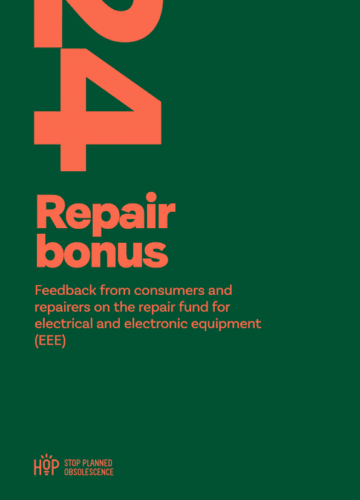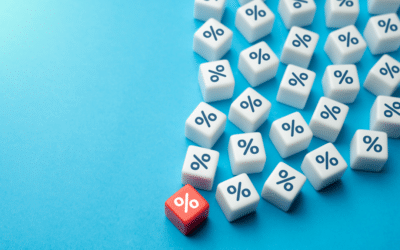The repair bonus is remarkable and is a pioneering initiative in France, a colossal effort to financially support every household in repairing their goods. It’s been pushed by the French Government and political actors to promote Circular Economy and reduce waste production.
HOP (Halte à l’Obsolescence Programmée) association, which advocated in the past for this measure, commends the efforts of Producer Responsability Organisations (PRO) and everyone involved in conceiving and applying it. In spite of great improvements, the association is questioning the results in favour of the public and repairers, especially small independent ones.
In this report, HOP tries to estimate with a scientific and independent approach, in collaboration with researchers, the benefits of the repairs bonus, one year after its implementation, and in regard to its objectives: make repairs more attractive thanks to simple and easy way to obtain financial incentives and a trustworthy label, in order to increase demands in repairs and boost the offer, to tend toward a more circular economy and job creations in these economic sectors.
This bonus is a tool in a larger and coherent commitment of the “Anti-Gaspillage et Économie Circulaire (AGEC—Anti-Waste and Circular Economy)” law.
Alongside the repairs funds, the Repairability Index (which will become in 2024 the Sustainability Index on some products) enlightens the consumers’ choice thanks to a grading system (from 1 to 10), thus quantifying the durability of new products to encourage more sustainable consumption and production habits. From these, other interesting initiatives have been born, like an eco-modulation and eco-contribution project (funding the end-of-life management of products according to the Polluter pays principle), according to the repairability of new products.
The European Union is taking inspiration from France. It’s committed to making durability the new norm in order to give more power to the consumer, notably by making sure unfounded or misleading environmental claims can’t be used as a sales argument.
Furthermore, a European index on Durability for smartphones and tablets, for example, should gradually appear on products starting in 2025. In spite of the potentially positive impact of this measure on the durability of products on the European market, they can only reach their goal if they are met with quality requirements at least as high as the French indexes.
Despite the fact that the benefits of repairs are undeniably positive for the environment, their proportion still needs to be increased. According to the ADEME, only 10% of electrical products and electronics are repaired once they’re past their warranty. Even if repairers are available, and consumers want to repair their products, most of them don’t. Almost 70% of them give up the idea because of the cost, and a lot of them invoke planned obsolescence.
Unfortunately, repairing is still to this day a greater effort and heavier mental load than buying a new product. That’s why the HOP association advocates for the repairs bonus to be simple and affordable for consumers. They see no interest (except moral) in changing their habits when it is so much more comfortable, fast and cheaper to buy a new product. As for repairers, they could find an economic incentive in proposing a repair bonus to their clients, betting on an increased visibility, revenue, attractiveness or customer loyalty, as a few examples.
This being said, the certifying process needs to be accessible to all, indiscriminately to small and independent repairers, allowing access for the customers to a territorial network, larger expertise, and in the end more attractive costs. The report shines light on administrative and financial obstacles for independent repairers and small companies, which need to be overcome for a stronger adhesion to the initiative.
Bonuses amounts, proximity to repairers and communication are key points in the success of this initiative.
Funded by PRO and eco-contributions, the strength of the repairs fund is that they can be applied to a lot of products and sectors. Almost a year after its application on electrical products and electronics, the textile industry is now involved with a bonus initiative Under the impulsion of Refashion. And toys, sports articles and repair tools should soon benefit from the same kind of initiative. However, the weakness in this EPR configuration lies in the lack of cohesion between those initiatives. The HOP association hopes the teachings of this report might benefit to all sectors, and that good practices be shared in order to maximize their efficiency and readability to all actors, from consumers to affiliated repairers. According to HOP, pioneering bonuses on electrical products and electronics act as virtuous habits that we should erect as general principles for all sectors, like not requiring proof of purchase, not restricting themselves to repairing one brand, or applying proximity criteria into the repairer’s choice.
Above all, what we learn from this study is that bonuses amounts, proximity to repairers (especially independent repairers) and communication are key points in the success of this initiative.
This report shows the difficulty of independent repairers to obtain the label allowing them to offer the repair bonus, and proposes some measures to remedy to this situation. It would be unsettling and concerning that the main beneficiaries of this initiative (among affiliated actors) should be the original producers, in view of their own influence in the PRO’s governance.
To increase the chances of success and raise efficiency, it would be best to focus financial incentives for a lot of French repairers on fewer products, prioritized according to their repairability, their level of household equipment or their environmental footprint, instead of spreading them on a large spectrum of products—sometimes less repairable or not at all—and only to a restricted number of affiliated repairers.
In order to continue those reflections with all actors and estimate the feasibility of the recommendations of this report, HOP asks the Government to regularly convoke the “Conseil National de la Réparation” (CNR—Nation Council on Repairs), and rethink the functioning of EPR systems.
Let’s go beyond economic incentives. They are essential for consumers, through the repairs fund, and are a good thing. However, to fully respond to the goal of extending the lifespan of products, HOP asks political decision-makers to make their efforts part of an integrated plan toward the development of Circular Economy. They have to assume the responsibility for other critical issues like repairers training, raising awareness to repairs starting in school, or putting safeguards against obsolescence marketing.



